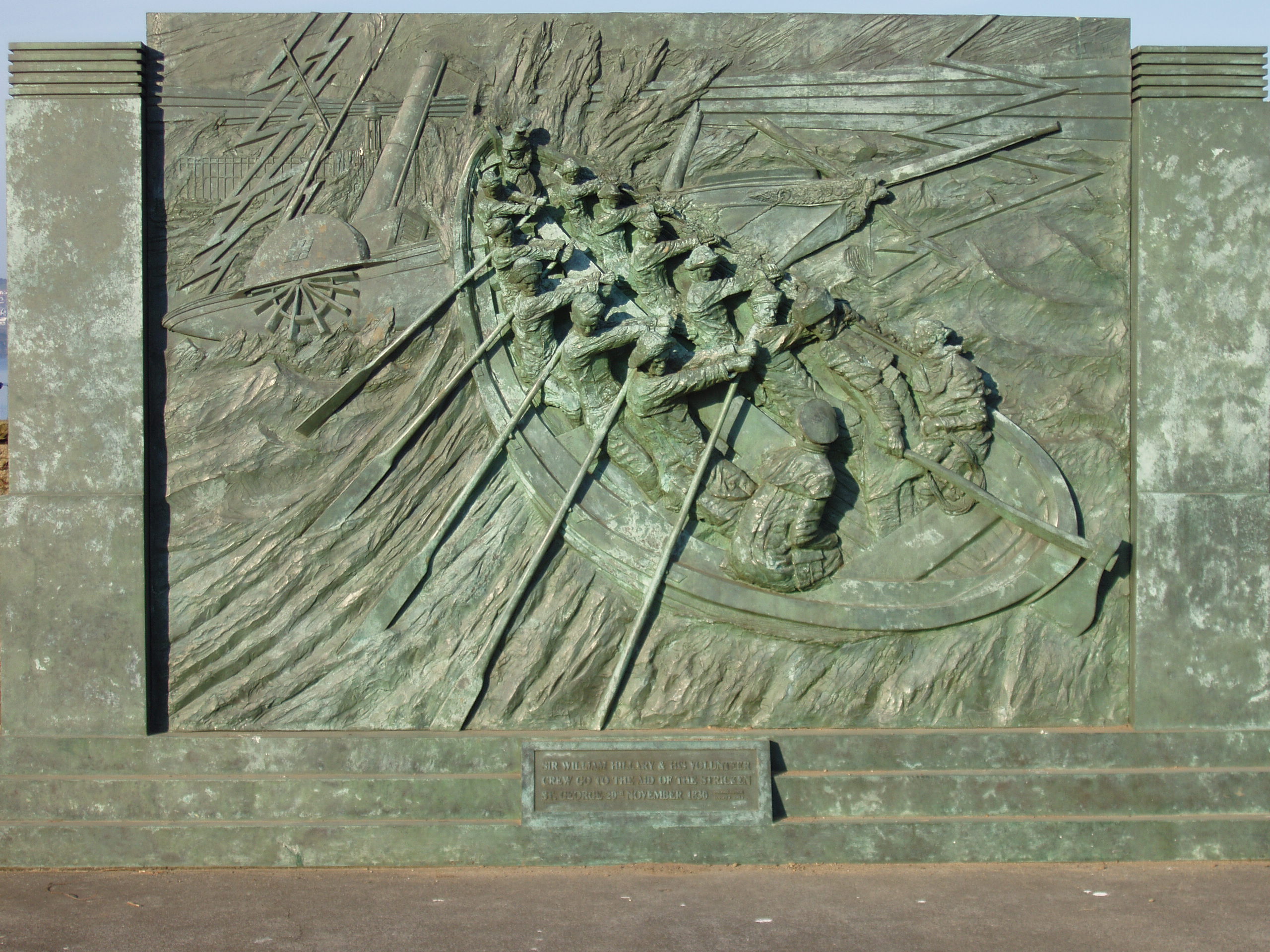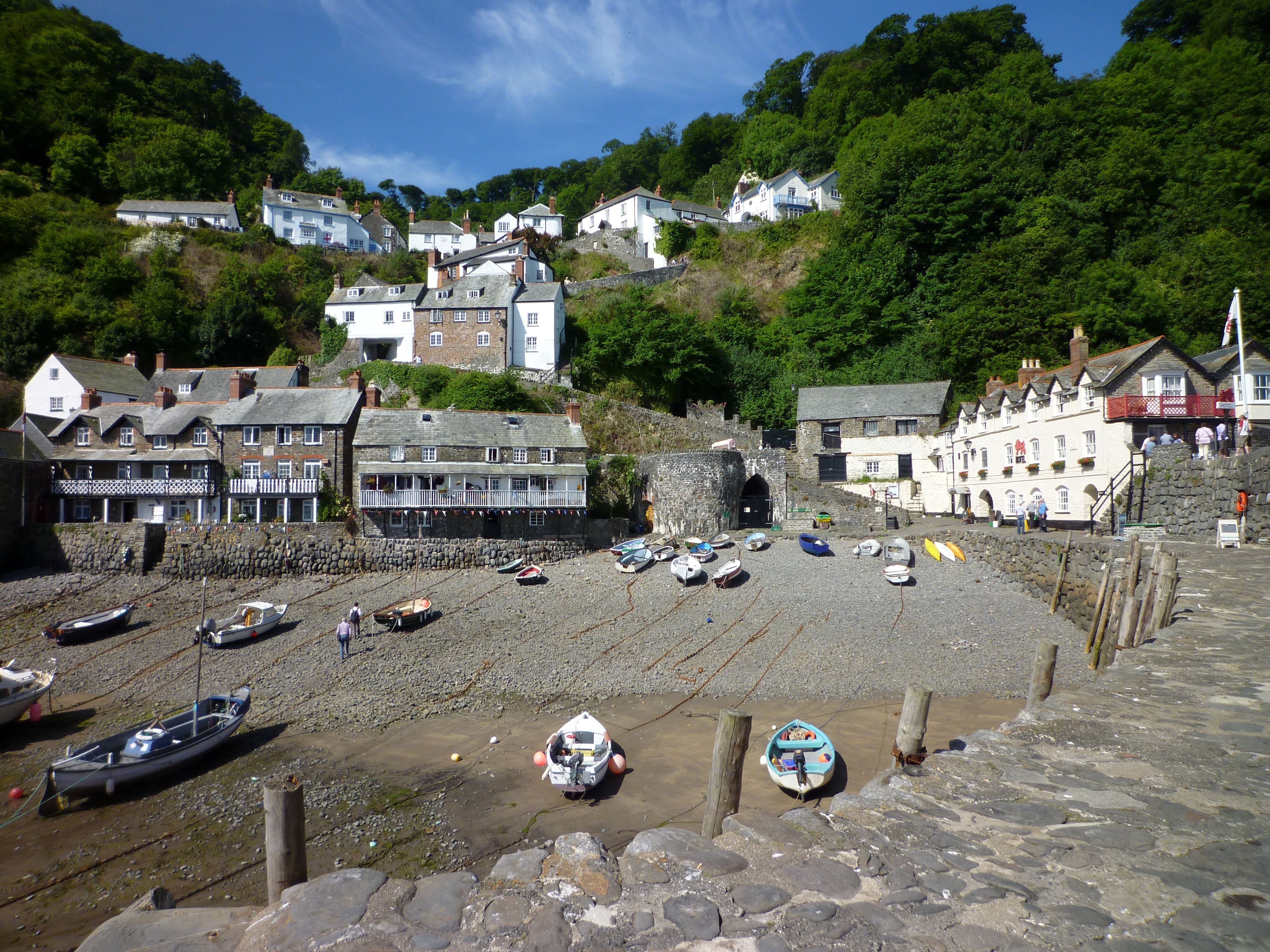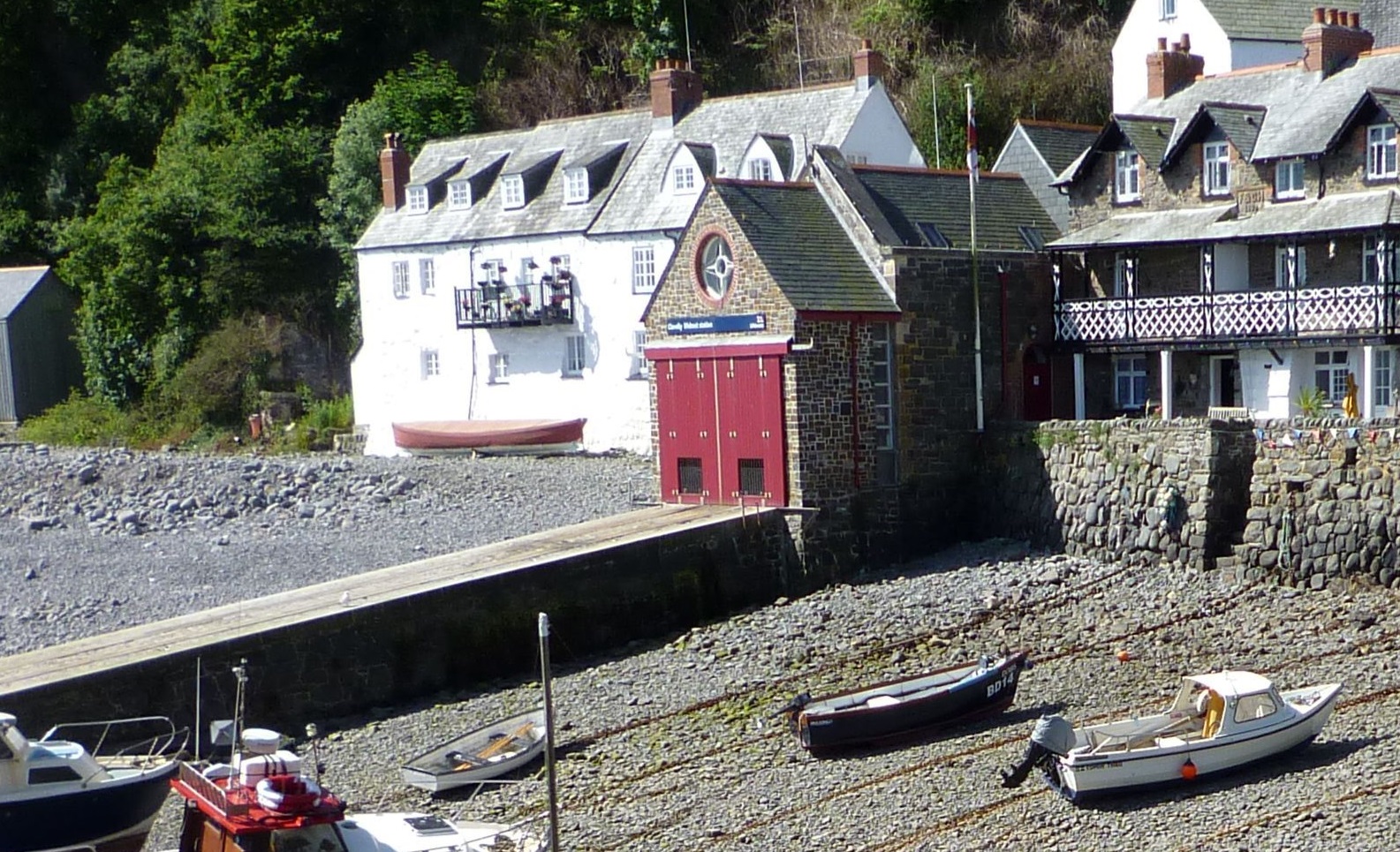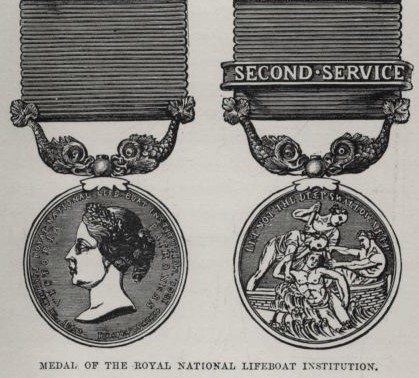|
Clovelly Lifeboat Station
Clovelly Lifeboat Station, serving the North Devon village of Clovelly and surrounding coastal waters, is run by the Royal National Lifeboat Institution (RNLI). It was established in 1870. The station is flanked by Appledore to the northeast and Bude to the southwest. History The first station was opened in 1870 after a particularly bad storm had resulted in a number of fishing boats being lost and fishermen drowned. The boathouse cost £175 to build. The Coxswain in 1908 was Thomas Pengilly, who became the then longest-serving coxswain in the service. A news article of 1935 noted that he had served Clovelly lifeboat for over 48 years, 14 as Second Coxswain and 24 as Coxswain. In the 32 years from 1899 the lifeboat saved 158 lives. Pengilly retired in 1929 after 54 years of service to the RNLI; he was succeeded as coxswain by Alfred Braund. Coxswain Braund was succeeded in 1932 by J. J. Headon, who retired in 1936 at the age of 60 after 40 years’ service. Coxswain in 1948 wa ... [...More Info...] [...Related Items...] OR: [Wikipedia] [Google] [Baidu] |
Devon
Devon ( , historically known as Devonshire , ) is a ceremonial and non-metropolitan county in South West England. The most populous settlement in Devon is the city of Plymouth, followed by Devon's county town, the city of Exeter. Devon is a coastal county with cliffs and sandy beaches. Home to the largest open space in southern England, Dartmoor (), the county is predominately rural and has a relatively low population density for an English county. The county is bordered by Somerset to the north east, Dorset to the east, and Cornwall to the west. The county is split into the non-metropolitan districts of East Devon, Mid Devon, North Devon, South Hams, Teignbridge, Torridge, West Devon, Exeter, and the unitary authority areas of Plymouth, and Torbay. Combined as a ceremonial county, Devon's area is and its population is about 1.2 million. Devon derives its name from Dumnonia (the shift from ''m'' to ''v'' is a typical Celtic consonant shift). During the Briti ... [...More Info...] [...Related Items...] OR: [Wikipedia] [Google] [Baidu] |
RNLI
The Royal National Lifeboat Institution (RNLI) is the largest charity that saves lives at sea around the coasts of the United Kingdom, the Republic of Ireland, the Channel Islands, and the Isle of Man, as well as on some inland waterways. It is one of several lifeboat services operating in the same area. Founded in 1824 as the National Institution for the Preservation of Life from Shipwreck, soon afterwards becoming the Royal National Institution for the Preservation of Life from Shipwreck, under the patronage of King George IV. On 5 October 1854, the institution’s name was changed to its current name (RNLI), and in 1860 was granted a royal charter. The RNLI is a charity in the UK and in the Republic of Ireland and has enjoyed royal patronage since its foundation, the most recent being Queen Elizabeth II until her death on 8 September 2022. The RNLI is principally funded by legacies (65%) and donations (28%), with the remainder from merchandising and investment. Most of th ... [...More Info...] [...Related Items...] OR: [Wikipedia] [Google] [Baidu] |
Royal National Lifeboat Institution
The Royal National Lifeboat Institution (RNLI) is the largest charity that saves lives at sea around the coasts of the United Kingdom, the Republic of Ireland, the Channel Islands, and the Isle of Man, as well as on some inland waterways. It is one of Independent lifeboats in Britain and Ireland, several lifeboat services operating in the same area. Founded in 1824 as the National Institution for the Preservation of Life from Shipwreck, soon afterwards becoming the Royal National Institution for the Preservation of Life from Shipwreck, under the patronage of King George IV. On 5 October 1854, the institution’s name was changed to its current name (RNLI), and in 1860 was granted a royal charter. The RNLI is a charity in the UK and in the Republic of Ireland and has enjoyed royal patronage since its foundation, the most recent being Elizabeth II of the United Kingdom, Queen Elizabeth II until her death on 8 September 2022. The RNLI is principally funded by Will (law), legacie ... [...More Info...] [...Related Items...] OR: [Wikipedia] [Google] [Baidu] |
Clovelly
Clovelly () is a privately-owned harbour village in the Torridge district of Devon, England. The settlement and surrounding land belongs to John Rous who inherited it from his mother in 1983. He belongs to the Hamlyn family who have managed the village since 1738. The village, which is built into the wooded sea cliffs of the north Devon shore, has a steep pedestrianised cobbled main street with traditional architecture. Due to the gradients, donkeys (now mostly replaced with sledges) have been used to move goods and cargo from Clovelly Bay. Visitors to the village entering via the visitor centre are required to pay an entrance fee which covers parking, entrance to two museums, Clovelly Court gardens, and an audiovisual history guide. The village is a tourist destination and is host to an annual Lobster and Crab festival. At the 2011 census, the parish population was 443, a decrease of 50 on the 2001 census. The island of Lundy is part of the electoral ward of Clovelly Bay. Hi ... [...More Info...] [...Related Items...] OR: [Wikipedia] [Google] [Baidu] |
Appledore Lifeboat Station
Appledore Lifeboat Station is the base for Royal National Lifeboat Institution (RNLI) search and rescue operations at Appledore, Devon in the United Kingdom. The first lifeboat was stationed in the town in 1825 and the present station was opened in 2001. It operates a all weather boat (AWB) and an B Class inshore lifeboat (ILB). History The Bideford District Association of the Royal National Institution for the Preservation of Life from Shipwreck (as it was then known) introduced a lifeboat service in February 1825. The boat was kept in the King's Watch House at Appledore. In 1831 the work was taken over by the Devon Humane Society and they built a new boat house at Watertown, half a mile nearer the sea. This was large enough for two boats and a second one arrived in December that year, but in 1848 was transferred to a second boat house at Braunton Burrows on the opposite side of the estuary. It was easier to launch from here to help ships on that side of the water, but crew ... [...More Info...] [...Related Items...] OR: [Wikipedia] [Google] [Baidu] |
Bude
Bude (; kw, Porthbud) is a seaside town in north east Cornwall, England, in the civil parish of Bude-Stratton and at the mouth of the River Neet (also known locally as the River Strat). It was sometimes formerly known as Bude Haven.''Cornish Church Guide'' (1925) Truro: Blackford; p. 66 It lies southwest of Stratton, south of Flexbury and Poughill, and north of Widemouth Bay, located along the A3073 road off the A39. Bude is twinned with Ergué-Gabéric in Brittany, France. Bude's coast faces Bude Bay in the Celtic Sea, part of the Atlantic Ocean. The population of the civil parish can be found under Bude-Stratton. Its earlier importance was as a harbour, and then a source of sea sand useful for improving the inland soil. This was transported on the Bude Canal. The Victorians favoured it as a seaside resort. With new rail links, it became a popular seaside destination in the 20th century. Bradshaw's Guide of 1866, Section 2, described Bude as: "a small port and picturesqu ... [...More Info...] [...Related Items...] OR: [Wikipedia] [Google] [Baidu] |
British Newspaper Archive
The British Newspaper Archive web site provides access to searchable digitized archives of British and Irish newspapers. It was launched in November 2011. History The British Library Newspapers section was based in Colindale in north London, until 2013, and is now divided between the St Pancras and Boston Spa sites. The library has an almost complete collection of British and Irish newspapers since 1840. This is partly because of the legal deposit legislation of 1869, which required newspapers to supply a copy of each edition of a newspaper to the library. London editions of national daily and Sunday newspapers are complete back to 1801. In total, the collection consists of 660,000 bound volumes and 370,000 reels of microfilm containing tens of millions of newspapers with 52,000 titles on 45 km of shelves. After the closure of Colindale in November 2013, access to the 750 million original printed pages was maintained via an automated and climate-controlled storage facilit ... [...More Info...] [...Related Items...] OR: [Wikipedia] [Google] [Baidu] |
Hartland Quay
Hartland Quay is located on the Atlantic coast of Devon, England, south of Hartland Point and north of Bude, Cornwall. It experiences some of the roughest seas in winter and is a former harbour. History The harbour dated back to the time of Henry VIII until a storm led to the complete destruction of the pier head and later the whole pier wall in 1887. Parts of the old formation stones can be seen at low tide. As well as evidence of a counter pier. The only evidence visible at all times is the lyme kiln. The old Customs House has been a hotel since 1886 and its former stables are now 'The Wrecker's Retreat' bar. The former corn and hay lofts are now hotel bedrooms. In 'The Wrecker's Retreat' are displayed memorabilia charting the history of Hartland Quay as well as displays of shipwrecks on the coast over the centuries. Also shown are the various films and television shows that have been filmed here. The former Coastguard cottages are now toilets, still a private residence, shop and ... [...More Info...] [...Related Items...] OR: [Wikipedia] [Google] [Baidu] |
Clovelly Harbour - Geograph
Clovelly () is a privately-owned harbour village in the Torridge district of Devon, England. The settlement and surrounding land belongs to John Rous who inherited it from his mother in 1983. He belongs to the Hamlyn family who have managed the village since 1738. The village, which is built into the wooded sea cliffs of the north Devon shore, has a steep pedestrianised cobbled main street with traditional architecture. Due to the gradients, donkeys (now mostly replaced with sledges) have been used to move goods and cargo from Clovelly Bay. Visitors to the village entering via the visitor centre are required to pay an entrance fee which covers parking, entrance to two museums, Clovelly Court gardens, and an audiovisual history guide. The village is a tourist destination and is host to an annual Lobster and Crab festival. At the 2011 census, the parish population was 443, a decrease of 50 on the 2001 census. The island of Lundy is part of the electoral ward of Clovelly Bay. Hi ... [...More Info...] [...Related Items...] OR: [Wikipedia] [Google] [Baidu] |
Awards Of The Royal National Lifeboat Institution
A number of Royal National Lifeboat Institution awards have been established by the Royal National Lifeboat Institution (RNLI) since its creation in 1824. None are approved by the Crown, and are therefore unofficial awards. As such, they do not appear in the official British order of wear, although the principal lifesaving award, the ''Medal of the RNLI'', can be worn on the right breast in uniform by members of the British armed forces. RNLI awards The RNLI awards include: Medal of the RNLI The medal was established in 1824, the same year the RNLI was founded, to reward "humane and intrepid exertions in saving life from shipwrecks on our coasts, deemed sufficiently conspicuous to merit honourable distinction". The medal can be awarded for saving life at sea in gold, silver and, since 1917, in bronze. While awards are now only made to lifeboat crew who risk their lives in rescue attempts, a number of nineteenth century medals were bestowed on others who saved life from the s ... [...More Info...] [...Related Items...] OR: [Wikipedia] [Google] [Baidu] |
Coxswain
The coxswain ( , or ) is the person in charge of a boat, particularly its navigation and steering. The etymology of the word gives a literal meaning of "boat servant" since it comes from ''cock'', referring to the cockboat, a type of ship's boat, and ''swain'', an Old English term derived from the Old Norse ''sveinn'' meaning boy or servant. In 1724, a "cockswain" was defined as "An officer of a ship who takes care of the cockboat, barge or shallop, with all its furniture, and is in readiness with his crew to man the boat on all occasions." When the term "cockboat" became obsolete, the title of coxswain as the person in charge of a ship's boat remained. Rowing In rowing, the coxswain sits in either the bow or the stern of the boat (depending on the type of boat) while verbally and physically controlling the boat's steering, speed, timing and fluidity. The primary duty of a coxswain is to ensure the safety of those in the boat. In a race setting, the coxswain is tasked with m ... [...More Info...] [...Related Items...] OR: [Wikipedia] [Google] [Baidu] |







